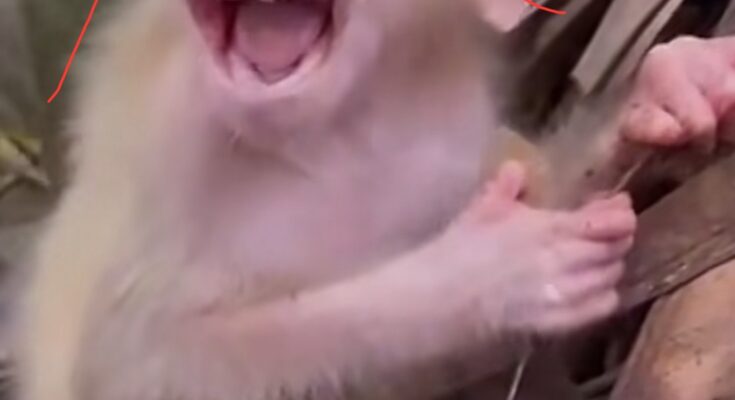In a heartbreaking incident deep within the tropical landscapes of Southeast Asia, a baby monkey sustained a serious spinal injury after falling from the heights of a swaying palm tree. The fall, witnessed by nearby locals and captured on video, has sparked an emotional response online and renewed conversations about wildlife safety in human-influenced environments.
The young macaque, believed to be no older than six months, was part of a small troop that had made its home near a palm plantation on the outskirts of a rural village. Witnesses say the infant monkey was playfully climbing after its mother when it lost its grip and plummeted over 30 feet to the ground.
Immediately after the fall, the baby was observed struggling to move its lower body, prompting local wildlife volunteers to intervene. A rescue team transported the monkey to a nearby wildlife rehabilitation center, where veterinarians confirmed the worst — a fractured spine that left the lower limbs paralyzed.
A Warning About Habitat Loss
This incident, while tragic, is unfortunately not isolated. As palm plantations and urban developments expand into forested areas, wild animals are increasingly forced to adapt to unfamiliar and often dangerous environments. Tall trees with limited canopy connectivity, slick surfaces, and noise pollution all contribute to higher risks for young, inexperienced animals.
Experts warn that habitat fragmentation is making it harder for animals to thrive safely in their natural surroundings. “When a monkey climbs a tree in the wild, it’s usually surrounded by other trees, creating a network of escape routes and safety nets. But in palm plantations, a single tree can become a deadly trap,” said Dr. Lina Charoen, a wildlife biologist working in the region.
Ongoing Care and Rehabilitation
The injured monkey, affectionately named “Milo” by his caretakers, is currently receiving 24-hour care. While the spinal injury is likely permanent, veterinarians are exploring options to improve his quality of life. This includes physical therapy, a custom mobility device, and eventually integrating Milo into a sanctuary with other monkeys who have special needs.
“This little monkey still has a lot of life in him,” said Dr. Arjun Patel, a vet at the rescue center. “We’re hopeful that with the right care, he’ll grow into a happy adult, even if he can’t swing from trees like the others.”
The Bigger Picture
Milo’s story has already inspired an outpouring of support on social media, where users are donating to the rehabilitation center and calling for stronger protections for wildlife living near agricultural zones. Wildlife advocates are urging palm oil producers and local governments to implement wildlife corridors and buffer zones to minimize such incidents.
The tragedy of Milo’s fall serves as a painful but important reminder of the fragile balance between human development and wildlife survival. As forests shrink and animal habitats are pushed to the brink, every tree—and every life that depends on it—matters more than ever.



